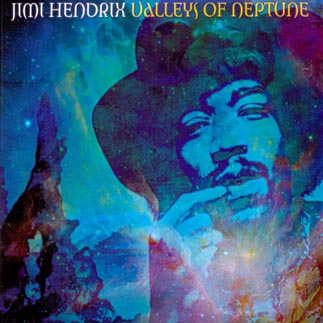
Album Review: Jimi Hendrix - "Valleys of Neptune"
Sometimes, you go back to what you know. It doesn’t matter if it’s been five days, five months, five years, or five decades. Sometimes, you just need a visit from an old familiar friend.
Enter Jimi Hendrix and “Valleys of Neptune.”
Yeah, it’s a cash-in. I know that. You know that. Everyone who’s ever enjoyed Jimi, from kids just now discovering what their dad’s musty old guitar stored in the attic can do, to those who remember when America was changing and Jimi was one the counter culture’s mascots knows that “Valleys of Neptune” is a cash-in. Hendrix LLC is condescending to us by trumpeting the album as “sixty minutes of never before heard Hendrix.” They’ve dug up every shred of everything Jimi ever put two thoughts together about, packaged it and succeeded mostly in diluting the product. Jimi Hendrix was a man with a guitar more than the brand name his ongoing legacy is shaping into (see also: Tupac.)
Yet, that doesn’t by necessity damn “Valleys of Neptune” to the abyss. In a modern world where modern music is overly categorized and defined by tropes, and each new artist must offer something fresh that is both acoustically and visually stimulating, it’s easy to forget that sometimes less is more. “Valleys of Neptune” is a well-timed poignant reminder that music can be so much more than a vehicle for public reaction. It’s interesting to hear an echo of the past and remember that a style so simple could be so revolutionary and at the same time not have gotten stale or been duplicated.
For all his reputation as the king of psychedelic rock musicians, Jimi was also the master of smooth blues rock. His unique insight into the experimental nature of blues let him devise never-before riffs and phrases that shaped his sound into a form not seen since, and possibly never again.
It is the unconstrained blues guitarist Jimi Hendrix who appears most frequently on “Valleys of Neptune.” The tracks were largely recorded in anticipation of his fourth, never finished studio album, and from “Free Stone” to “Crying Blue Rain,” we see Hendrix and an arsenal of different musicians trying different variations on his trademark sound.
Most of these tracks have been released posthumously in one form or another, although perhaps not these exact versions. New cuts of old classics like “Fire” do make the listener wonder if Hendrix ever intended for these sessions to be released. Was this really any kind of framework for another album, or was this just the exercise of a master jamming with his friends, recorded and kept for posterity? It’s difficult to say, as we see Jimi really let loose of form, as he winds his way through a long, twisting, left-field take on “Hear My Train A Comin’.” Right after that, we experience (if you’ll pardon the pun,) Hendrix and friends tackle “Sunshine of Your Love,” which except for the first minute and last minute, bears no similarity to the original, and is mostly just an excuse for Hendrix to jam.
Most of these sessions were recorded sometime between 1968 and 1970, by which time The Who and Led Zeppelin had taken hold of rock and roll’s reins and snapped them into a fury. So, we see “Lullaby for the Summer,” and “Crying Blue Rain,” two more powerful, chord driven songs than Hendrix’s usual subtle catalog. Were these an attempt by Jimi to see if he could make their sound work for him? Without having a final, polished and released product, we may never know the intent that Hendrix had for these pieces, but the speculation is half the fun.
Plus, there’s a new, eight-minute “Red House.” Love it. You could play that song with a theremin and a jug, and I would say it was among the most brilliant songs ever.
If you’re a classic rock aficionado, or a Hendrix completist, by all means, look into “Valleys of Neptune.” For everyone else, most of this stuff is floating around somewhere, and in truth there’s nothing revolutionary about the album. The important lesson is this: Forget Hendrix LLC. No matter your flavor of music, if you’re a fan of rock of any kind, you owe Jimi himself. Big.

